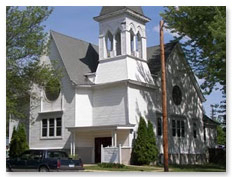Sermon
Notes

Brian Thiel
Sunday
Worship
10:45am
Communion
is served
every Sunday
to any Christian
who chooses
to partake.
Bible Study
Computer CDs
A curriculum of direct Bible study
for grades 3 - 8
on CDRoms is available.
Call for details.
|

Remembered for her wisdom, not her shame
The Samaritan woman at the well of Sychar
Key Text: John 4 "Come, see a Man who told me all things I ever did.
Could this be the Christ?" v. 29
Intro: There is a raging fire in the tinder dry hills. A TV reporter gets
the assignment to get video from the air and rushes to the airport for a
twin engine charter flight waiting in front of the hangar. He arrives, jumps
in and says lets go. After takeoff the pilot asks, where next? The reporter
tells him to fly low and slow as close as he can over the fires. The pilot
hesitates... "Why?" " Because I need to get footage back to my network,"
shouts the reporter over the cockpit noise. The pilot pauses longer and says
finally... "so then you're not my flight instructor?"
The point: everybody has countless instances through life where "unexpected"
things happen. Today's encounter while Jesus was traveling through "foreign"
territory was one of those unexpected events for the unnamed Samaritan woman
in John 4.
Talk about an ordinary person... this time we don't even know her name. But
John tells of her amazing interaction with Jesus.
John's gospel follows a very different pattern from Matt, Mark & Luke.
Rather than
follow a timeline of Jesus 3-year ministry, John picks selected incidents as
his way to support the point of his book... which he states in the first 18
verses.
- Most people call the book's beginning a prologue in which John
clearly states a thesis - a theological proposition (using philosophical
construct - WORD - logos). From that starting point John presents the
evidence for his thesis that Jesus IS THAT WORD which he, John,
personally witnessed as glory from above, John 1:14.
- Beginning with John the Baptist - he gives examples of people who
believed Jesus was the promised Messiah - WORD
- Jesus picked 12 men with common, ordinary life stories who were
remarkably willing to leave their usual pursuits and follow Him as he
moved from place to place.
Then, Jesus, in his home town region performs a miracle at a wedding
which strengthened the belief of the chosen 12.
- Next John carefully documents that there was serious opposition to
Jesus from the earliest days of his ministry when Jesus disrupts the
corruption of unfair business in the Temple. Official opposition
persisted during all his ministry. (Sometimes a better
understanding of a person comes from who his opposition is rather than
who the supporters are.)
- In chapter 3, John begins a series of interpersonal encounters in
some depth telling how people are responding to this remarkable
person... Jesus.
Nicodemus, from within the opposition forces comes for a private meeting
to find out more about Jesus. In the end he may have been more perplexed
by the depth of Jesus than he thought. Then is the account of how John
the Baptist related to Jesus and his understandings about Jesus.
- In Chapter 4 - John tells about Jesus first glimmer of acceptance
among a semi-foreign people, the Samaritans.
An unusual setting, even for Jesus who was no slave to conventional
ways.
John 4:1-8
Travel via Samaria - "no respectable Jew went there."
Jesus needed to avoid the opposition as he returned to Nazareth.
No respectable person went to the city well in the heat of the day.
But a woman who was despised by her townspeople would go then to avoid the
stares or worse. Jesus, waiting at the well while the disciples went into
the town to buy food was thirsty, too, but had no way to draw water
The very place was steeped in Jewish history. It was the field
purchased by Abraham, later it was Jacob's dwelling place, the well he had
dug, altars he built. Why now, was it "off limits" to Jews?
A sad, sad time in Israel's history came in 721BC when the Assyrians
conquered the northern kingdom of the divided nation. Most of the population
were carried away, but some small clans and settlements remained and they
intermarried with the surrounding peoples and their religion became a
partial expression of worship to the one God mixed with idol worship and
customs. Because of that, Jews by Jesus' time despised them even more than
the pagan Greeks or Romans because the people were only half right.
This anonymous woman was also a very unconventional person.
John 4:9-16
By asking HER for a drink, something no "respectable" Jewish man would
lower himself to do... HE was initiating a civil conversation with HER.
She was no dummy, she was perfectly aware how remarkable that was and it
stimulated her to engage in dialogue.
At first is was about water. Imagine having running water when all your life
you had to pump it or lift it from a well and carry it home.
Somehow, part of her sensed he was getting at something else.
When Jesus asked her to go get her husband, the conversation took a new
turn.
Jesus turned this into a deep conversation with a real question.
John 4:17-26
A huge mistake made by many educated people is thinking illiterate people
are stupid. Wrong. This woman hit on the key point of difference between the
hybrid religion of the Samaritans which mixed the monotheism from Abraham &
Jacob with pagan idols and rituals, from that of the Jews who abhorred any
resemblance to idolatry. (In fact, Jewish leaders accused Jesus of idolatry,
making himself equal with God.)
Side point: What about dealings, personal encounters, with people whose
religion is opposed to your own? In Jesus' community, just talking to ANY
Samaritan was defilement, akin to apostasy. It was like willingly exposing
yourself to a dangerous germ.
Jesus handled this differently... he did not ignore the real difference
between true and false faith, but he did NOT HATE or ALIENATE any person who
followed a false faith.
Main point: John is establishing here that the faith Jesus introduced to the
world is just as available to people who follow partial truth as to those
who think they are following absolutely pure truth.
But this conversation ended as so many do... inconclusively... due to an
interruption. The 12 came back from the town with lunch. They were wide eyed
to see WHO Jesus was talking to. But, already, they knew Jesus well enough
not to ask stupid questions... v27
Acceptance of new truth, the mark of all remarkable people
John 4:28-30, 39-42
"Could this be the Christ?" -- Similarly to the Jews, the Samaritans had
a form of belief that God would intervene into human history again as he had
with Moses. And from the word of this "low life" in the eyes of their own
city, their interest was just as great as hers... IS THIS the MESSIAH?
So many rushed out to the well, and for two days there was a series of
encounters with the people there... AND MANY BELIEVED...
(As Luke documents in Acts, the church became well established in Samaria
very early in its history.)
It doesn't matter who YOU are... or what you have been.
I doesn't depend on who I am either.
The future of this church, this group of believers, depends on you!
If your life is made brighter, if your faith becomes clearer, it WILL
show through. And other people can only become interested in also following
the same Christ that you and I are following.
It doesn't matter what unsavory events have clouded our lives.
WE, ALL OF US, can make a difference to the people we know, when we speak of
the truth that we have experienced.
These days, it seems unlikely any of us will have a totally unexpected
personal conversation with the creator of the universe. But we can
tell about the things we read and learn in HIS word. We can humble ourselves
and let that truth work its way into every part of our daily life.
Others will notice... nobody can prevent that. It will matter.
Jesus Paid It ALL. THAT is something you and I can all pass along by letting
our lives continue changing all the way to the end. The scriptures teach we
are to believe in Jesus, confess our sins, reform our lives (the word is
repent), and be baptized. When others see the gradual and continuing
reformation of our lives, they will be drawn to the Savior and Lord who is
changing us.
|



